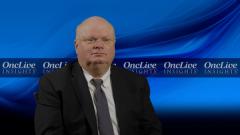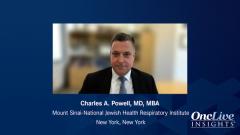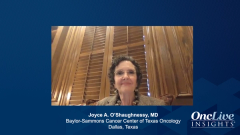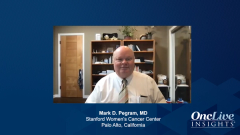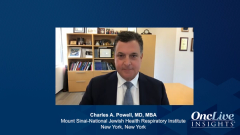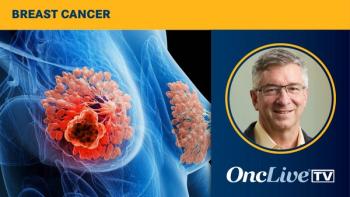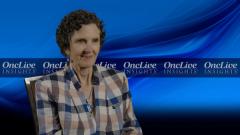
Managing ILD: Taking Therapeutic Class Into Account
Brief considerations for the impact an agent’s therapeutic class can have on how interstitial lung disease should be approached.
Episodes in this series

Transcript:
Joyce A. O’Shaughnessy, MD: What kind of buckets do you put these agents in, Mark? You have given it quite a bit of thought here, these various management strategies differ by agents.
Mark D. Pegram, MD: It’s very different depending on which agent you’re talking about. For example, in the case of everolimus or even the CDK4/6 inhibitors, for asymptomatic ILD [interstitial lung disease] you can play through and simply observe those cases. Whereas, in the case of immune checkpoint inhibitors, for trastuzumab deruxtecan, it’s recommended to interrupt the dose for those drugs for any ILD. In fact, for trastuzumab deruxtecan, you are to interrupt the drug even for asymptomatic grade 1 pulmonary toxicity, and then wait until it resolves to grade 0 and consider the use of steroids even for grade 1 ILD at 0.5 mg/kg of prednisolone equivalent. If it resolves within 28 days or less from the date of onset, you can maintain the same dose level and resume treatment, but if it takes longer than 28 days, you are actually to do a dose reduction in the case of trastuzumab deruxtecan. If there’s symptomatic ILD, that is grade 2 or above in the case of that drug, you’re to permanently discontinue and give steroids at 1 mg/kg prednisolone equivalent and then don’t rechallenge with that drug, for example. In the case of immune checkpoint inhibitors, you’re to consider steroids for grade 2 or above, for example.
It is very different by drug class. The timing and onset is different by drug class. The work-up in terms of early referral to pulmonary [specialists] is critical to make sure you rule out other drug causes. Another consideration is drug-drug interactions in the case of CDK4/6 inhibitors. For example, abemaciclib can interact with CYP3A metabolized drugs, so you’re to avoid ketoconazole and other drugs that have CYP3A inhibitory effect because that can increase the likelihood of toxicities from that agent just by the drug-drug interactions and concomitant medications that these patients may be taking. That’s another interesting twist. Always check the concomitant medication list with whatever drugs patients are on, if you suspect ILD, to make sure there isn’t some interaction that could be changing the drug levels.
Joyce A. O’Shaughnessy, MD: That’s great. Like in trastuzumab deruxtecan, it’s very helpful what you just said, Mark. It’s very well delineated now. Charles, I’m sure you and other experts have had a lot of input into that, into how do we manage this more safely. The point of at grade 1, you stop, and you wait. You either treat with steroids or you don’t, but you wait until it resolves, and then you can either use the same dose with a quick resolve, and dose reduce if it’s a longer resolve, but you can rechallenge.Beyond that you can’t rechallenge, it’s a permanent stop with any symptom. That’s very helpful. I remember similarly with everolimus that it is different. It’s at the base of the lungs. It’s more of a vascular injury as I recall. You get this patchy stuff at the base of the lungs. You can find it on chest imaging as asymptomatic, and as I recall, you can just keep treating through it. You have to watch the patient carefully. When you get to symptoms, you want to treat, hold the agent, and treat. From the clinical trial, you’re starting at 10 mg, you can go down to 5 mg. You can rechallenge at a lower dose, and many times patients will do fine. If they get into severe symptoms that’s a whole different matter, and we would not rechallenge, etc.
Transcript edited for clarity.


